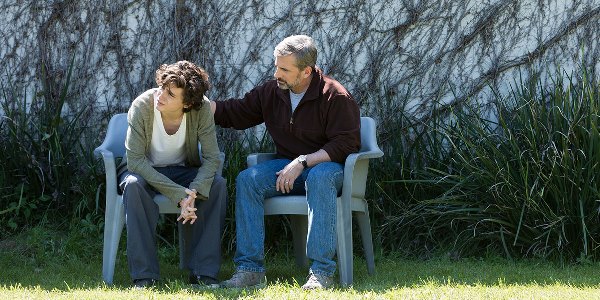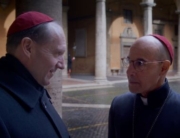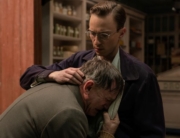Beautiful Boy verges on boring, but it’s not really the movie’s fault. It may be dull because addiction definitely is boring.
The movie is a tightly focused story of a family’s beloved son hooked on drugs and the cycle of using, cleaning up, relapsing in agony, and cleaning up again that plays itself out in a numbing repetition that all of us with an addicted family member know—and even those who don’t but who have watched plenty of 1970s’ movies of the week.
David Sheff (Steve Carell) enjoys a loving rapport with his oldest son Nic (Timothée Chalamet, achingly vulnerable and just as beautiful as the title promises). Nic is a bright kid, an aspiring writer, and artist. He and his dad dig 1990s indie rock and surfing expeditions together from their sun-dappled Northern California home and seem closer than most fathers and sons. When Nic nonchalantly offers to get his father high on a trip to the beach, David senses a line has been crossed. When the promising boy decides not to go to college, David knows there’s something really wrong. It’s only the beginning of a harrowing journey for them both. Heroin, meth, LSD: Nic does it all, and to the limit. In his words, drugs turn a black-and-white world into Technicolor.
Based on the nonfiction book by David Sheff, the film explores the frustration and guilt a parent feels around a child’s addiction, the fear when the phone rings, the wondering if something could have been done differently, and the rage at the excuses and lies. It does so thoroughly. Carell plays a celebrated writer, but the character seems to possess little verbal dexterity or insight. We see a lot of David exploding in anger or staring numbly into space at home. These scenes reflect the twin prisons of addiction, which not only trap the addict but seal loved ones in another kind of trap. It’s a realistic depiction and raw in its way, but it doesn’t illuminate what we already know about the topic. David’s ex-wife and current wife appear in the story, but they don’t add much to a very masculine context, as Beautiful Boy might as well be titled Beautiful Bro.
David stews in despair and self-recrimination. Nic shoots up and collapses in San Francisco’s streets and dive bars, sometimes with fetchingly messed-up female company. The film may not wish to glamorize drug use, but helped along by stylish, golden-lit camerawork, Nic’s wild life does look more adventurous, tactile, and frankly sexier than his father’s comfortable domesticity. Scenes of Nick in Narcotics Anonymous confessing his sins hint at an emotional openness that the older man can’t share. The scales may be tipped in favor of Nic, too, by the two performances, where Carell seems dramatically overmatched. As always, addicts get all the attention, while the people who love them have to stoically hold the bag.
I may have unfairly disparaged the film earlier by comparing it to a movie-of-the-week period piece. The film makes an up-to-date point that those movies missed. Exploring the addiction at its center, the story line flashes back to tender scenes of affection and trust between father and son, so a lack of love was not a factor in Nic’s troubles. Parents and children are closer and their relationships less hierarchical than ever before—hey, they even listen to Nirvana together. Seventies-style repression and denial have evaporated, replaced with treatment, meds, and family therapy. But kids—and adults—still get hooked on drugs, with all the calamity addiction brings. Why? No one knows. Although it can be stark viewing, Beautiful Boy courageously stares that question in the face. Like the rest of us, it has no answers.







Leave A Comment